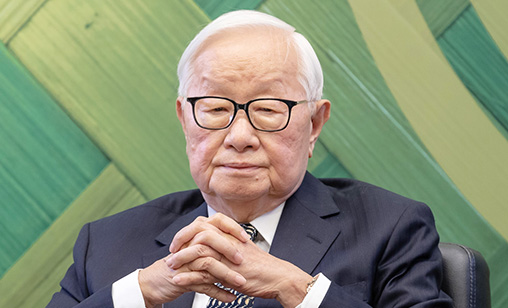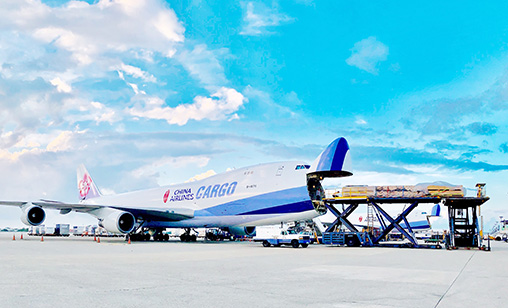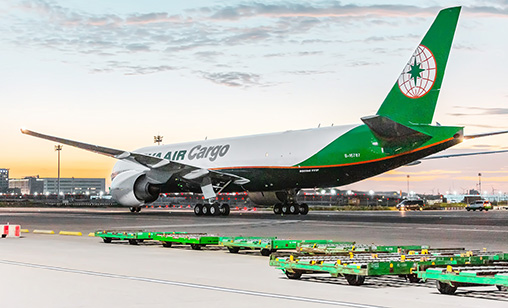Special Report: Greater China Air Cargo Update
Semiconductor industry linchpin of Taiwan’s cargo sector
October 1st 2023
When Morris Chang founded the Taiwan Semiconductor Manufacturing Company (TSMC) in 1987, he decided the future of the business and a chance for Taiwan was a horizontal integration model that differed from the then dominant vertical production integration by a single institution. Read More »
“We win together with our customers in long-term relationships that last,” is TSMC’s motto. The trust-based winning formula has elevated TSMC and Taiwan into the industry’s stratosphere. “In the case of the semiconductor industry, the global supply chain that enables the aforementioned technological progress is remarkably complex. Some companies play a diverse set of roles and others are highly specialized, but no single company, indeed no single country is capable of internally performing all roles in the supply chain for all the types of semiconductors required for a modern economy,” Center for Strategic & International Studies (CSIS) reports.
 |
We tend to look the semiconductor industry through the lens of its final products: the high value and compact computer chips that are best transported by air, but the reality is air freight is not the dominant transport mode in the semiconductor supply chain.
“Both air freight and sea freight play vital roles in TSMC’s global supply chain. As a result of the synergy of these two modes, we achieve the optimal balance between cost and efficiency,” TSMC told Orient Aviation.
In the semiconductor value chain, from the design, fabrication, assembly test and packaging (ATP) stages - Taiwan has a prominent role in fabrication with 25.4% of global wafer fabrication materials market share. In 2022, it led all rivals in the sector, ATP Materials Market Data Subscription (MMDS) reports.
At the same time, with only a 0.4% share in the semiconductor manufacturing equipment (SME) market in 2021, TechInsights 2023 data shows Taiwan is one of the biggest buyers of production equipment.
“China Airlines plays a pivotal role in the transportation of semiconductor machinery across the world due to the maturity of the Taiwanese industry, an exceptional geographic location and the reach of our network,” the airline said. “Contracts for the transportation of semiconductor machinery and associated details are handled by vendors and forwarders with China Airlines (CAL) acting as the provider of professional transportation services,” CAL. the operator of the Taiwan’s biggest cargo airline, told Orient Aviation.
Being based in Taiwan allows local carriers, including CAL rival, EVA Airways, to build expertise in dealing with the semiconductor supply chains.
“From our early days, EVA Air has served the major global semiconductor companies through logistics service providers. Goods we have carried have included wafers and equipment, parts, products from accessory suppliers and more,”EVA Air told Orient Aviation.
“China Airlines operates scheduled freighter services to all key equipment exporters around the world, including Singapore, Japan, Europe and the U.S. The 777F is assigned to the U.S. to take advantage of fuel efficiency and the 747-400F operates short-haul routes in Asia and Europe. Priority is given to the 747-400F on routes favored for semiconductor equipment with higher demand,” CAL said.
 |
“Operating both aircraft types concurrently gives us more flexibility in dispatching cargo and helps maintain a competitive edge.”
The flag carrier also flies charter services for long-term customers. “The charter business is an important contributor to the airline’s overall cargo revenue,” CAL said.
“For us to fulfill our customer’s needs as they work to meet soaring global demands for their latest-generation chip or device, we regularly adjust our flight network and frequency. We do not limit EVA’s services to the boundaries of our published schedule, especially not our freighters,”EVA said.
“We make every effort to design cargo services, especially for the leading semi-conductor and tech companies. The greatest demand for transport of semi-conductors and related manufacturing industry products is on trans-Pacific North America-Asia routes.
“We operate 25 freighter flights and 84 passenger flights from Taiwan to North America every week. Expediting airfreight transfers through Taipei, we efficiently and reliably transport equipment with odd dimensions to major cities in Southeast Asia, Japan, China and all 10 of our gateways in North America: Los Angeles, San Francisco, Seattle and Vancouver on the west coast; Atlanta in the south, Chicago in the Midwest, Toronto in central Canada, Dallas and Houston in the southwest and also to New York.”
CAL is changing the modus operandi of its air freight division because of a decline in air cargo demand to the U.S. and an increase in passenger aircraft belly cargo capacity as commercial air traffic recovers from the pandemic.
“As a result, supply and demand in the air transportation market has shifted. We have reduced U.S. routes, strengthened import/export services in Southeast Asia and expanded our sources for cargo from Asia to Europe,”CAL said.
Both CAL and EVA Air point out the transport contracted by the semiconductor and other high tech industries often has operational challenges. “Semiconductor equipment is larger in size and requires more hold space. China Airlines takes into account market supply and demand and the distribution of cargo is adjusted accordingly,”the airline said.
 |
“Special measures, including load placement and temperature control are implemented by the aircraft to ensure safe transportation.
“Semiconductor capital equipment can only be accommodated by a 747 freighter. They run on four engines with expensive fuel burn instead of advanced, state-of-art twin-engine freighters that have the benefits of energy savings and carbon reduction.”
“The greatest challenge a carrier faces is choosing the right type of freighter to give its operations optimal balance and benefits,” EVA Air said.
Clearly, the semicoductor supply chain is critical to the bottom lines of Taiwan’s airlines. Yet measuring the precise share of this market in the overall business of an airline can be challenging to calculate.
“Taiwan’s semiconductor industry is of global significance. But industry development and equipment upgrades are cyclical, so deliveries in the semiconductor industry can vary depending on the size of particular regional markets and market share. Japan, Singapore, Europe, and the U.S. all vary in their shares of cargo revenue,” CAL said.
“It’s difficult to pinpoint the volume of all the air cargo we manage specifically for the semiconductor industry.
“There also are many, many related shipments for products with complicated functions vital to the latest electrical components: highly sensitive machinery, chemical materials, other parts, gears, and more.”
Published Taiwan airport data calculates these products exceeded 45% of total air freight volume in the first half of 2023, EVA said.
TSMC does not identify its biggest air cargo partners. “Our primary consideration depends on airlines being available at the location of the cargo to meet our global supply chain needs,” it said.
“Selection of partnerships is based on cargo safety, delivery times, pricing and other influences provided by the airlines,” TSMC said.
When asked what improvements TSMC wanted from airlines, overwhelmingly the answer was digital transformation.
| 'Considering the global footprint of TSMC, we expect airlines to refine their cargo hub functions based on the characteristics and current situations of various regions' |
| Taiwan Semiconductor Manufacturing Company |
“Digital transformation is a critical imperative for survival. The aviation industry should embrace the application of new technologies, such as smart warehouse facilities, real-time cargo information platforms and efforts to bridge with customer systems,” TSMC said.
“This enables customers to accurately track the location and status of their goods without temporal or spatial limitations and quickly adapt and seize opportunities in the ever-changing global trade landscape.”
The Taiwanese semiconductor giant also expects airlines to improve international air rights and route planning:
TSMC said potential airline partners must sharpen operational safety measures. “This includes stricter operational safety checks, theft prevention equipment and safety training to safeguard aviation logistics infrastructure,” it said.
“Additionally, cargo crisis management plans must be upgraded to respond swiftly to unforeseeable scenarios.”
TSMC’s requirements are challenging, but it believes they are necessary given the volatility of the market:
“The global supply chain can be affected by many factors from natural disasters to international trade disputes. To mitigate the risk of supply chain disruption, industries may need to consider more diversified supply chain strategies to ensure stable capacity, flexibility, innovation and sustainability and be able to adapt to rapid changes in technology and the market, This is essential to ensure the stability and reliability of the supply chain,” TSMC told Orient Aviation.
Global supply chain trends are supply chain digitalization, enhancing supply chain visibility, transparency and efficiency, multi-sourcing and mitigation of risk.
Green supply chains taking into account sustainability are becoming a crucial consideration in supply chain management. while collaborative partnerships will strengthen supply chain partners by sharing information, joint research and development and risk-sharing to address common challenges, TSMC said.
China Airlines is adopting the iCargo solution from IBS Software to promote greater digitization.”“The existing cargo transportation system will be replaced by an all-new one-stop platform for hold space sales, import/export processes, air mail handling, and revenue settlement,” CAL said.
“Taiwan is at the heart of the global semiconductor manufacturing industry. The country has grown and developed with the release of every new technology and we have efficiently and professionally tailored effective shipping solutions for these innovations” EVA Air said.
daniel rob says:
November 23rd 2024 06:23pm